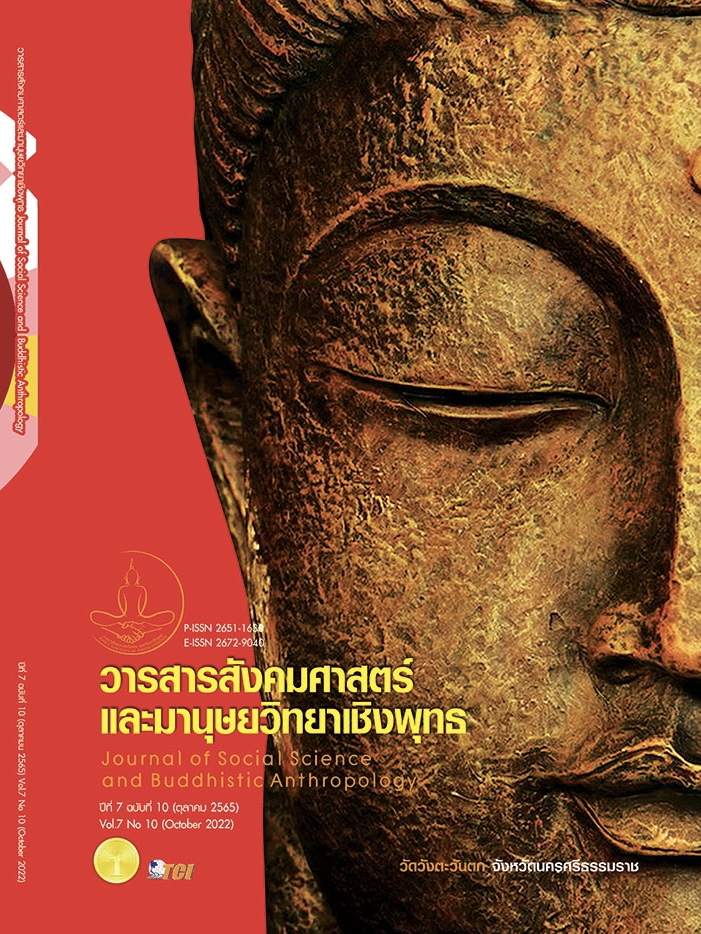A DEVELOPMENT OF LEARNING CENTER MANAGEMENT STRATEGIES USING PHILOSOPHY OF SUFFICIENCY ECONOMY BASED IN PHIANGLUANG 16 SCHOOL UNDER CHIANG RAI PRIMARY EDUCATIONAL SERVICE AREA OFFICE 4
Keywords:
Strategy, Learning Center Management, The philosophy of sufficiency economy, Life Skills, BuddhabatvernplaAbstract
The objective of this research article was to develop of learning center management strategies using philosophy of sufficiency economy based in Phiangluang 16 school by mixed methodology that there are 4 steps. 1) basic information study that data was collected via reviewing of documents and related literature, meeting 35 participants, interviewing 10 school administrators, conducting of a focus group discussion involving 22 participants, all of whom were purposively selected. 2) strategy development by drafting and doing connoisseurship by 7 scholar experts. 3) implement the strategy for student life skills assessment. And 4) strategy evaluation by 32 school administrator, teachers and school committee by questionnaires, all of whom were purposively selected. The research tools were a semi-interview form, focus group discussion, connoisseurship, questionnaires, life skills assessment form. Research data were percentage, mean, standard deviation, analyzed with content analysis in order to synthesize to derive at conclusions. The findings showed that 1) the results of the background information revealed that there were 6 components of learning center management and the result of the SWOT analysis consisted of 6 strengths, 3 weaknesses, 4 opportunities and 4 threats. 2) The learning center management strategies using philosophy of sufficiency economy based in Phiangluang 16 school, there were 6 strategies, 33 approaches and 35 indicators. 3) The results of strategy implementation showed 94.37 % of primary school students grade 1 - 6 and 100% of secondary school students have good and excellent quality of life skills. 4) The Strategies’ propriety, feasibility and utility standards were at the highest level.
References
กระทรวงศึกษาธิการ. (2556). การนำหลักปรัชญาของเศรษฐกิจพอเพียงไปจัดการศึกษาในสถานศึกษา. กรุงเทพมหานคร: คณะทำงานบูรณาการเศรษฐกิจพอเพียงสู่การเรียนการสอนกระทรวงศึกษาธิการ.
นิรุต ถึงนาค. (2551). ครู พลังสำคัญในการขับเคลื่อนหลักปรัชญาเศรษฐกิจพอเพียงสู่การจัดการเรียนรู้. วารสารครุศาสตร์ มหาวิทยาลัยราชภัฏมหาสารคาม, 6(1), 20-24.
มาลัย ทองสิมา. (2562). การพัฒนายุทธศาสตร์การเตรียมความพร้อมด้านทักษะอาชีพของนักเรียน ชั้นมัธยมศึกษาตอนปลาย จังหวัดนครปฐม เพื่อรองรับสังคมไทย 4.0. วารสารสังคมศาสตร์บูรณาการ, 6(2), 19-48.
โรงเรียนเพียงหลวง 16. (2563). รายงานการวิเคราะห์สภาพแวดล้อมของโรงเรียนเพียงหลวง 16. เชียงราย: โรงเรียนเพียงหลวง 16 สำนักงานเขตพื้นที่การศึกษาประถมศึกษาเชียงราย เขต 4.
วินัย หริ่มเทศ. (2563). กลยุทธ์การบริหารแหล่งเรียนรู้ที่พึงประสงค์ของโรงเรียนในสังกัดสำนักงานเขตพื้นที่การศึกษามัธยมศึกษา เขต 41. มนุษยสังคมสาร (มสส.), 19(1), 117-136.
ศาลินา บุญเกื้อ และนันทกาญจน์ ชินประหัษฐ์. (2557). การถอดบทเรียนและวิเคราะห์อัตลักษณ์ ศูนย์การเรียนรู้ตามหลักปรัชญาของเศรษฐกิจพอเพียงด้านการศึกษา. กรุงเทพมหานคร: ศูนย์สถานศึกษาพอเพียง มูลนิธิยุวสถิรคุณ.
สมบัติ นพรัก. (2561). ศาสตร์พระราชาสู่การพัฒนาศาสตร์การบริหาร. กรุงเทพมหานคร: อมรินทร์.
สำนักงานคณะกรรมการการศึกษาขั้นพื้นฐาน. (2554). แนวทางการพัฒนาทักษะชีวิต บูรณาการการเรียนการสอน 8 กลุ่มสาระการเรียนรู้ หลักสูตรแกนกลางการศึกษาขั้นพื้นฐาน พุทธศักราช 2551. กรุงเทพมหานคร: โรงพิมพ์ชุมนุมสหกรณ์การเกษตรแห่งประเทศไทย จำกัด.
สำนักงานคณะกรรมการการศึกษาขั้นพื้นฐาน, องค์การยูนิเซฟ ประเทศไทย และมูลนิธิไรท์ ทูเพลย์. (2560). ทักษะชีวิต รหัสครูศตวรรษที่ 21: การจัดการเรียนการสอนเพื่อพัฒนาทักษะชีวิตแห่งศตวรรษที่ 21. กรุงเทพมหานคร: สำนักงานคณะกรรมการสถานศึกษาขั้นพื้นฐาน.
สำนักงานเลขาธิการสภาการศึกษา. (2560). แผนการศึกษาแห่งชาติ พ.ศ. 2560 - 2579. กรุงเทพมหานคร: พริกหวานกราฟฟิค.
สำนักมาตรฐานการศึกษาและพัฒนาการเรียนรู้. (2558). รายงานการศึกษาแนวทางการพัฒนาศูนย์การเรียนรู้และสื่อการเรียนรู้ตามแนวปรัชญาของเศรษฐกิจพอเพียงของโรงเรียนในโครงการตามพระราชดำริ สมเด็จพระเทพรัตนราชสุดาฯ สยามบรมราชกุมารี. กรุงเทพมหานคร: พริกหวานกราฟฟิค.
สุเมธ ตันติเวชกุล. (2555). 15 ปี จากวิกฤตเศรษฐกิจ : เศรษฐกิจพอเพียงกับความยั่งยืนของสังคมไทย ใน พื้นฐานความคิดเศรษฐกิจพอเพียงจากงานโครงการอันเนื่องมาจากพระราชดำริ. กรุงเทพมหานคร: มูลนิธิชัยพัฒนา.
สุรพงษ์ ลาตวงษ์ และศศิรดา แพงไทย. (2563). กลยุทธ์การจัดการแหล่งเรียนรู้ของศูนย์วิทยาศาสตร์เพื่อการศึกษาในภาคตะวันออกเฉียงเหนือ. วารสารมหาวิทยาลัยนราธิวาสราชนครินทร์ สาขามนุษยศาสตร์และสังคมศาสตร์, 7(1), 98-110.
Coulter, M. (2008). Strategic Management in Action. (4th ed.). New Jersey: Pearson Education.
NCREL/Metiri Group. (2003). 21st Century Skills: Literacy in the Digital Age. Retrieved Jun 9, 1964, from http://www.ncrel.org/engauge/skills/skills/
Stella, A. (2013). Potential of school gardening as a laboratory for developing life skills in agriculture in primary schools: A case study of Soroti and Kamuli Districts, Uganda. Retrieved jun 9, 1964, from https://www.ruforum.org /documents/potential-school-gardening-laboratory-developing-life-skills-agriculture-case-universal
Thompson, A. A. et al. (2007). Crafting & Executing Strategy: The Quest for Competitive Advantage: Concepts and Cases. (15th ed.). New York: The McGraw-Hill Companies, Inc.
UNESCO. (2008). Community Learning Certres: Country Report From Asia. Bangkok: UNESCO Bangkok.
Downloads
Published
How to Cite
Issue
Section
License
Copyright (c) 2022 Journal of Social Science and Buddhistic Anthropology

This work is licensed under a Creative Commons Attribution-NonCommercial-NoDerivatives 4.0 International License.









